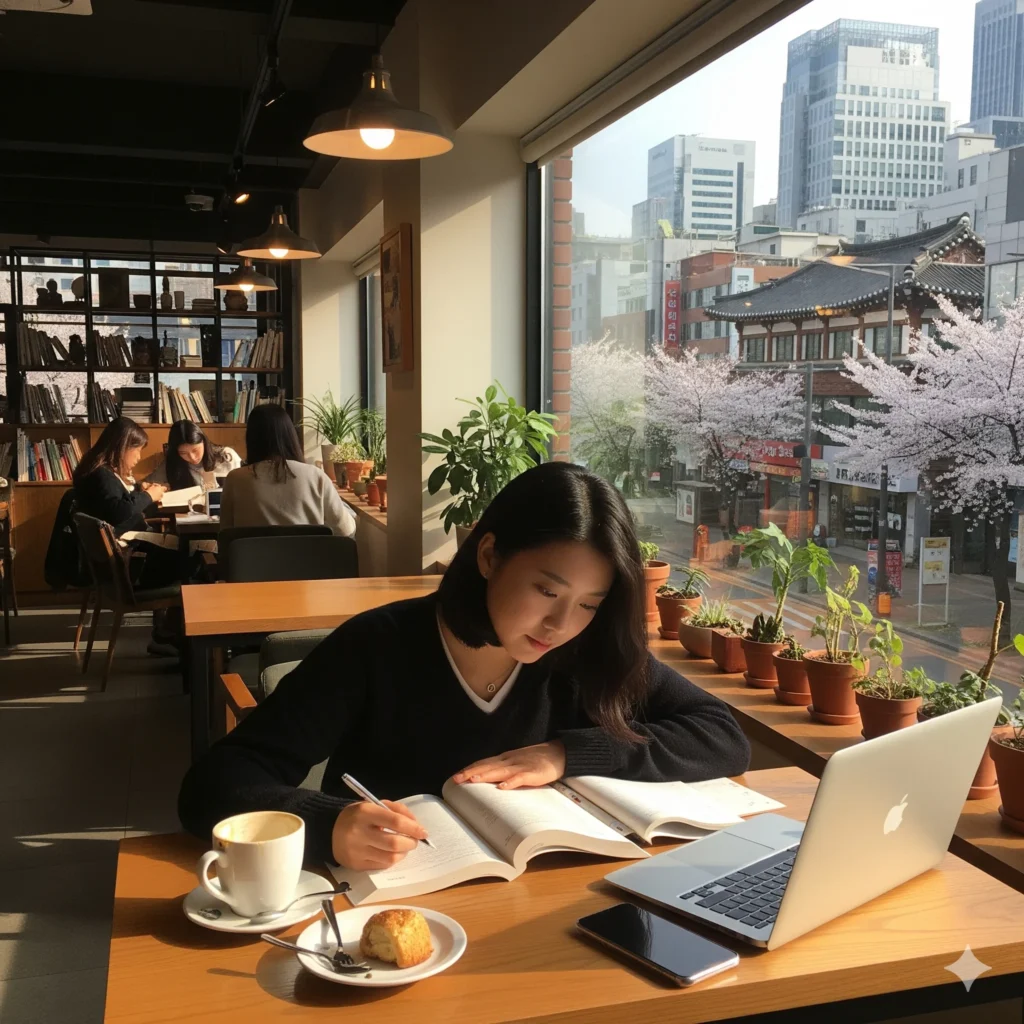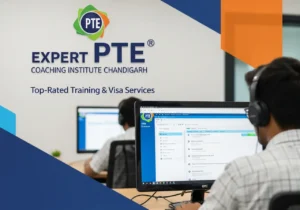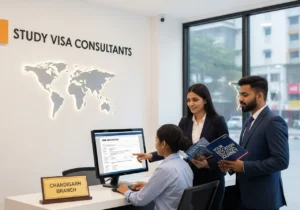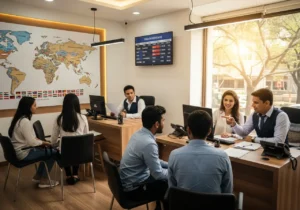
USA Student Visa Chandigarh: Expert Guide 2026
Table of Contents USA Student Visa Chandigarh: Your Complete 2026 Roadmap Chandigarh stands as India’s education hub, with nearly one in every ten residents studying
![]()

Are you dreaming of pursuing higher education in one of Asia’s most dynamic countries? South Korea for study has emerged as a premier destination for international students seeking exceptional academic opportunities, cutting-edge research facilities, and vibrant cultural experiences. As an SEO expert with two decades of experience in digital marketing and educational consulting, I’ve witnessed South Korea’s remarkable transformation into a global education hub that attracts over 160,000 international students annually.
From prestigious institutions like Seoul National University and KAIST to comprehensive scholarship programs worth millions of dollars, South Korea offers unparalleled opportunities for academic growth and career advancement. Whether you’re interested in engineering, business, Korean studies, or cutting-edge technology programs, Korean universities provide world-class education taught in English alongside traditional Korean programs.
South Korea for study represents one of the most compelling educational investments you can make in today’s globalized world. The country’s education system consistently ranks among the top globally, with six universities featured in the QS World University Rankings top 100. This remarkable achievement for a nation of South Korea’s size demonstrates the exceptional quality of education available to international students.
Korean universities have gained international acclaim for their rigorous academic standards and innovative research programs. Seoul National University ranks 31st globally, while institutions like KAIST and Yonsei University maintain positions within the top 60 worldwide. These rankings reflect the universities’ commitment to academic excellence, world-class faculty, and state-of-the-art research facilities.
The masters programs in South Korea are particularly noteworthy, offering specialized degrees across diverse fields including engineering, business administration, international studies, and technology. These programs combine theoretical knowledge with practical applications, ensuring graduates are well-prepared for the global job market.
One of the most significant advantages of choosing South Korea for study is the extensive availability of English-taught programs. Leading universities like KAIST offer most courses entirely in English, while Seoul National University provides comprehensive English programs in business, engineering, and international studies. This accessibility removes language barriers and allows international students to focus on their academic pursuits while gradually learning Korean.
South Korea’s position as a global technology leader provides students with unparalleled access to cutting-edge research and innovation. The country’s significant investment in research and development, coupled with partnerships between universities and major corporations like Samsung and LG, creates unique opportunities for students to engage in groundbreaking research projects.
When considering South Korea for study, understanding the landscape of top-tier institutions is crucial for making informed decisions. The country’s universities offer diverse academic programs, exceptional faculty, and comprehensive support systems for international students.
Seoul National University (SNU) stands as the crown jewel of Korean higher education, often referred to as the “Harvard of South Korea”. With 15 colleges offering 85 undergraduate programs and 106 master’s programs across five fields of study, SNU provides comprehensive educational opportunities. The university’s Graduate School of International Studies (GSIS) offers a prestigious two-year Master’s program in International Studies, covering international commerce, security, and cooperation.
Korea Advanced Institute of Science and Technology (KAIST) excels in science and technology education, ranking 53rd globally. Located in Daejeon, KAIST offers most classes in English and is renowned for its engineering, computer science, and natural sciences programs. The institution’s commitment to English-language instruction makes it particularly attractive for international students.
Yonsei University ranks 56th in the QS World University Rankings and offers exceptional programs through its Underwood International College. The university provides 16 majors taught entirely in English, spanning humanities, arts, social sciences, and integrated science and engineering. Yonsei’s strong emphasis on international education and diverse student body creates an ideal environment for global learning.
Korea University (67th in QS rankings) offers comprehensive support systems for international students, including mental health counseling in English and academic mentoring programs. The university’s Graduate School provides extensive scholarship opportunities, with some students receiving full tuition fee exemptions based on academic performance.
Pohang University of Science and Technology (POSTECH) specializes in materials science, chemistry, and electrical engineering, maintaining a high proportion of international students at 15%. The institution’s focus on science and technology research makes it ideal for students pursuing advanced degrees in STEM fields.
Ulsan National Institute of Science and Technology (UNIST) offers all courses entirely in English across engineering, sciences, and business. Despite being established in 2007, UNIST has rapidly gained recognition as one of South Korea’s top-ranking universities, demonstrating the country’s commitment to educational innovation.
Sejong University consistently maintains excellent national rankings while providing full English programs at undergraduate and postgraduate levels. The university’s colleges of social sciences, business and economics, and hospitality and tourism management offer comprehensive English-taught curricula.
The most prestigious opportunity for international students is the Global Korea Scholarship (GKS), formerly known as the Korean Government Scholarship Program. This fully-funded program, launched by Korea’s Ministry of Education in 2010, currently supports scholars from over 150 countries worldwide. For Indian students, the 2026 GKS program allocates 78 scholarships, including 50 University Track and 28 Embassy Track positions.
The GKS program provides comprehensive benefits including economy class round-trip airfare, tuition fees up to 5 million KRW (approximately ₹3.05 lakhs), monthly allowances, research allowances, Korean proficiency grants, medical insurance, and academic incentives up to 630,000 KRW per month. The scholarship duration varies by program: Master’s degrees receive 3 years of support, doctoral programs receive 4 years, and bachelor’s programs receive 5-7 years.
Individual universities offer substantial scholarships Korea programs to attract exceptional international students. Korea University’s comprehensive scholarship system includes Global Leader Scholarships providing full or partial tuition coverage based on academic performance. The university’s Excellence Scholarship A offers full tuition fee coverage for students with outstanding GPAs, while the Challenge Scholarship provides support for students demonstrating improved academic performance.
Seoul National University and other leading institutions offer similar merit-based scholarships, with some programs covering up to 80% of tuition fees for qualified international students. These scholarships often require maintaining specific GPA requirements and may include additional benefits such as accommodation support and research allowances.
Beyond government and university funding, numerous private organizations and corporations provide scholarships Korea opportunities for international students. These programs often target specific fields of study or research areas aligned with Korea’s national development priorities, including technology, engineering, and international business.
When planning for South Korea for study, understanding the complete cost structure is essential for informed decision-making. Tuition fees for international students vary significantly based on the institution type, program level, and field of study.
Public universities generally offer more affordable options, with undergraduate programs ranging from ₩4-6.5 million annually (approximately ₹2.5-4.1 lakhs), while private institutions may charge considerably more. Masters programs in South Korea typically cost ₩5-7.5 million annually (₹3.15-4.7 lakhs), and doctoral programs range from ₩6-8.5 million annually (₹3.75-5.3 lakhs).
The monthly cost of living for international students in South Korea ranges from ₩1.2-2.5 million (approximately ₹75,000-₹1.6 lakh), depending on lifestyle choices and location. Seoul, being the capital and most expensive city, requires higher budgets compared to other Korean cities like Busan or Daegu.
Accommodation options significantly impact overall expenses. University dormitories represent the most budget-friendly choice, costing ₩350,000-800,000 monthly. Goshiwons (small private study rooms) start around ₩300,000 monthly and provide basic amenities with privacy. Off-campus apartments vary considerably, with studio apartments in Seoul starting around ₩500,000 monthly and significantly less in other cities.
Food expenses constitute a significant portion of living costs, with monthly food budgets ranging from ₩300,000-500,000. Students can reduce costs by cooking meals rather than dining out frequently. Transportation costs average ₩50,000-100,000 monthly, while utilities (electricity, water, gas) add another ₩50,000-100,000.
Health insurance, mandatory for all international students, costs approximately ₩100,000 monthly. Miscellaneous expenses for entertainment, shopping, and personal care typically range from ₩100,000-200,000 monthly, allowing students to enjoy Korea’s vibrant cultural scene while maintaining reasonable budgets.
Successfully gaining admission to Korean universities requires meeting specific academic and language proficiency requirements. Most universities require international students to demonstrate English proficiency through standardized tests, with minimum scores varying by institution and program level.
For undergraduate programs, universities typically require TOEFL iBT scores of 71 or higher, IELTS Academic scores of 5.5 or higher, or equivalent test results. Graduate programs generally require higher scores, with TOEFL iBT 79+ and IELTS 6.5+ being common requirements. Some prestigious programs may require even higher scores, emphasizing the importance of strong English language preparation.
While many programs are taught in English, Korean language proficiency can significantly enhance academic and social experiences. The Test of Proficiency in Korean (TOPIK) is the standardized assessment for Korean language skills. TOPIK has six levels: Levels 1-2 (Beginner), Levels 3-4 (Intermediate), and Levels 5-6 (Advanced).
Regular university degree programs typically require TOPIK Level 3 or higher for admission, while graduation requirements often specify Level 4 or higher. Some universities and scholarship programs prefer Level 5-6 proficiency, particularly for programs taught in Korean. International students without Korean proficiency can still apply to English-taught programs while working toward Korean language competency during their studies.
The application process requires careful preparation of academic transcripts, letters of recommendation, personal statements, and financial documentation. Students must provide proof of financial capability, typically requiring bank statements showing ₩15,000-20,000 (approximately $12,000-16,000) for students in the Seoul metropolitan area.
Application deadlines vary by university and program, with most institutions accepting applications during spring (February-March) and fall (July-August) admission cycles. Early preparation is crucial, as document authentication, translation, and visa processing require considerable time.
International students require a D-2 student visa for degree programs lasting more than 90 days. The visa application process requires submission of the university’s Certificate of Admission, academic transcripts, financial proof, health certificates, and additional documentation depending on the applicant’s nationality.
Visa processing typically takes 4 working days, with fees ranging from ₹3,400-7,650 depending on visa type and duration. Students must apply for an Alien Registration Card within 90 days of arrival, which permits multiple entries and exits while maintaining student status.
Sunland Education and Immigration Consultant Chandigarh stands as one of the premier immigration and education consulting firms in North India, specializing in facilitating international education opportunities. Established in 2001, the company has built an exceptional reputation for providing genuine guidance and quality services to students aspiring to study abroad, including those interested in South Korea for study programs.
The consultancy’s comprehensive expertise covers all aspects of the study abroad process, from initial counseling and country selection to visa applications and pre-departure preparation. Their experienced counselors provide personalized guidance to help students select the most suitable universities and programs based on individual qualifications, IELTS scores, and academic backgrounds.
Sunland Education and Immigration Consultant Chandigarh offers specialized support for students interested in universities in South Korea and masters programs in South Korea. Their services include assistance with university selection, application preparation, document verification, and scholarship application support. The consultancy maintains updated knowledge of Korean university requirements, application deadlines, and scholarship opportunities, ensuring students receive current and accurate information.
The firm’s expertise extends to scholarships Korea programs, helping students identify and apply for various funding opportunities including the GKS scholarship, university-specific scholarships, and private funding sources. Their comprehensive understanding of scholarship requirements and application processes significantly improves students’ chances of securing financial support for their Korean education.
Beyond university applications, Sunland Education and Immigration Consultant Chandigarh provides complete visa services, including D-2 student visa applications for South Korea. Their document preparation services ensure all required paperwork meets Korean embassy standards, while their financial guidance helps students understand and prepare for the cost implications of studying in South Korea.
The consultancy also offers language preparation support, including IELTS coaching and guidance on TOPIK preparation for students interested in Korean language proficiency. This comprehensive approach ensures students are academically, linguistically, and culturally prepared for their Korean education journey.
Campus Culture and International Student Communities
South Korea for study offers rich cultural experiences that extend far beyond classroom learning. Korean universities prioritize creating inclusive environments for international students, with dedicated support services, cultural orientation programs, and student organizations designed to facilitate smooth cultural integration.
Universities like Yonsei and Korea University maintain vibrant international student communities, with approximately 12% and 8% international student populations respectively. These diverse communities create natural support networks and cultural exchange opportunities, helping international students adapt to Korean academic and social environments while building lifelong global friendships.
Most universities offer Korean language programs specifically designed for international students, recognizing the importance of local language skills for comprehensive cultural integration. These programs often run parallel to degree studies, allowing students to gradually develop Korean proficiency while pursuing their academic goals.
Cultural immersion opportunities abound through university clubs, traditional festivals, and community engagement programs. Students can participate in traditional Korean activities, explore historical sites, and engage with local communities, creating meaningful connections that enhance their overall educational experience.
Seoul and other major Korean cities offer dynamic lifestyles combining traditional culture with cutting-edge modernity. Students can explore world-renowned technology districts, enjoy vibrant entertainment scenes including K-pop and K-drama culture, and experience diverse culinary traditions.
Graduates from Korean universities enjoy excellent career prospects both within Korea and internationally. Korea’s position as a global technology and business hub creates numerous opportunities for international graduates, particularly in fields like engineering, technology, international business, and Korean studies.
Many Korean universities maintain strong industry partnerships with major corporations like Samsung, LG, and Hyundai, providing students with internship opportunities and potential employment pathways. The Korean government’s policies supporting international talent retention also create favorable conditions for qualified graduates seeking to build careers in Korea.
A degree from a prestigious Korean university carries significant international recognition, particularly in Asia-Pacific regions. The combination of high-quality education, cross-cultural competency, and language skills (Korean and English) makes graduates highly attractive to multinational corporations and international organizations.
Korean universities’ emphasis on innovation, technology, and international perspectives aligns perfectly with global industry demands, ensuring graduates possess relevant skills for evolving job markets worldwide.
Successful students begin their South Korea for study journey with thorough preparation. This includes researching university-specific requirements, preparing required documents well in advance, and developing basic Korean language skills even for English-taught programs. Understanding Korean cultural norms and social etiquette facilitates smoother integration and more positive academic experiences.
Korean universities maintain high academic standards, requiring consistent effort and dedication from international students. Successful students actively engage with professors, participate in research opportunities, and take advantage of academic support services. Building relationships with both Korean and international students creates valuable learning networks and cultural exchange opportunities.
Effective financial planning extends beyond initial cost calculations to include ongoing budget management and scholarship maintenance requirements. Students should understand GPA requirements for scholarship continuation, explore part-time work opportunities (available after six months with proper permits), and take advantage of student discounts and university facilities to manage expenses effectively.
South Korea for study represents an exceptional opportunity for international students seeking world-class education, cutting-edge research experiences, and vibrant cultural immersion. With prestigious universities in South Korea offering comprehensive masters programs in South Korea, extensive scholarships Korea opportunities, and strong post-graduation career prospects, the country provides an ideal environment for academic and personal growth.
The combination of government support through programs like GKS, university-specific scholarships, and expert guidance from Sunland Education and Immigration Consultant Chandigarh makes Korean education accessible to qualified international students. While costs require careful planning, the long-term returns on investment in Korean education – including enhanced career prospects, global network development, and cross-cultural competency – justify the initial financial commitment.
As you embark on your South Korea for study journey, remember that success depends on thorough preparation, cultural openness, and academic dedication. The country’s commitment to international education, combined with its position as a global technology and business leader, ensures that your Korean education experience will provide invaluable skills and perspectives for your future career.
Ready to begin your South Korean education adventure? Contact Sunland Education and Immigration Consultant Chandigarh today to explore your options and take the first step toward achieving your academic dreams in one of Asia’s most dynamic educational destinations. Share this comprehensive guide with fellow aspiring students and leave your comments below about your South Korea for study plans – your journey toward academic excellence starts now!

Table of Contents USA Student Visa Chandigarh: Your Complete 2026 Roadmap Chandigarh stands as India’s education hub, with nearly one in every ten residents studying
![]()

Table of Contents Introduction: Why Choose an Expert PTE Coaching Institute in Chandigarh? Every year, over 1.8 million Indian students pursue education abroad, making global
![]()

Table of Contents Introduction Chandigarh has emerged as India’s premier study abroad hub, with over 10,000 students per lakh population securing international education in the
![]()

Table of Contents Introduction Studying abroad has become more than just an academic aspiration—it’s a strategic investment in your future. With over 1.88 million Indian
![]()

Table of Contents Introduction Chandigarh has become North India’s immigration hub, hosting over 1,800 registered visa consultants in Chandigarh who collectively process thousands of successful
![]()

Table of Contents Introduction Choosing the right education consultant Chandigarh can be the difference between achieving your study abroad dreams and facing unnecessary setbacks. With
![]()

Table of Contents Top Study Abroad Consultant Chandigarh: Your Gateway to Global Education in 2026 Pursuing international education opens doors to world-class opportunities, but
![]()

Table of Contents Introduction Finding the best immigration consultants in India 2026 has become more critical than ever as millions of Indians pursue opportunities abroad.
![]()

Table of Contents Why Choose Australia for Higher Education? Australia has consistently ranked among the top five destinations for international students worldwide. With over 700,000
![]()

Table of Contents Why You Need Professional Visa Assistance Navigating international immigration can be overwhelming without proper guidance. The best visa assistance for visitor Chandigarh
![]()
Welcome to Sunland Education & Immigration Consultants, Chandigarh (SEIC) which are serving in immigration field from last 23 years .

Copyrights © Sunland Immigration 2025